For the last months I have been based at the University of Malta, that has kindly hosted me as a visiting fellow. In December and January I will be based in Mauritius. I will mainly look into the current maritime security situation in the Western Indian Ocean, and continue the research on the 2020 Wakashio oil spill.
Author Archives: admin
Maritime Domain Awareness networks – presentations in Rome
Maritime Situational and Domain Awareness (MDA) is one of the key solutions in the maritime security tool box and one of the core themes of my recent research. Since almost 20 years the Italian navy facilitates one of the most important international mechanisms for MDA, known as the Virtual-Regional Maritime Traffic Center and the Trans-Regional Maritime Network. I participated in the annual expert meeting on December 1st, and introduced the key conclusions from SafeSeas research on how to improve MDA.
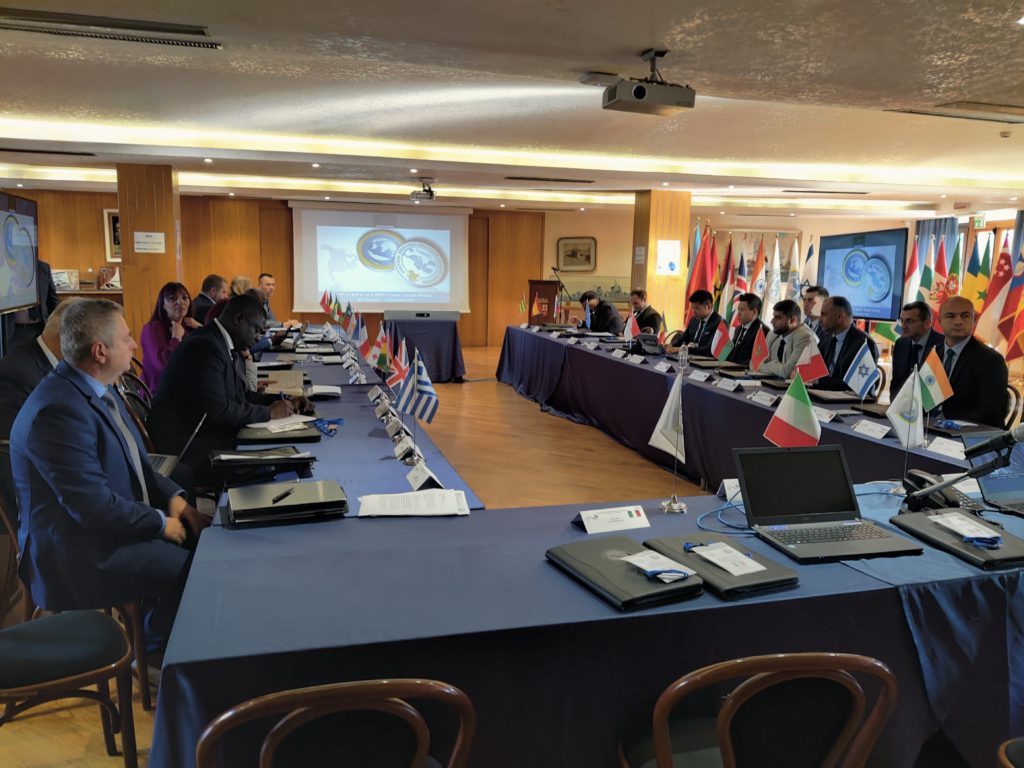
Twenty two navies were represented at the event, including representatives from Ghana, Kamerun, Brazil Argentina, Singapore and from the Mediterranean Sea and Black Sea. The event offered the opportunity to reflect on the importance of MDA in different settings and how to extend and improve data exchange in the network.
The network relies on the FENIX system hosted by the Italian navy. FENIX is conceived as a “service-oriented infrastructure for maritime traffic tracking”. It provides tools for identifying suspicious behavior at sea, a shared list of Vessels of Interest, as well as a chat function. It hence provides similar functions, as other tools such as the U.S. platform Seavision, or the IORIS platform developed and promoted by the E.U. in the Indo-Pacific region. Such platforms can be important additional decision making instruments for operations at sea. The greatest strength of a platform such as FENIX is the communities that it connects by synchronizing data from different national and regional sources, but also by provide direct channels of communication.
Like other networks also the VRMTC/T-RMN faces the challenge of how to deal with the fact that MDA initiatives have multiplied over the years. The long term experience with the two initiatives might help to better network the networks and make a global community of maritime security practice a reality. It could in particular help to better standardize Vessels of Interest lists, and incident reporting.
Forum on European Maritime Domain Awareness
Maritime Domain Awareness, in short MDA, is one of the most important solutions in the maritime security tool box. It centers on the idea that surveillance, data collection and information sharing can improve the response to maritime security incidents, deter threats, and identify suspicious behavior. The EU operates two related MDA platforms: The Common Information Sharing (CISE) platform focuses on the civil domain and is operated by the European Marine Safety Agency (EMSA); the Maritime Surveillance (MARSUR) platform focuses on military purposes and is developed by the European Defense Agency (EDA).
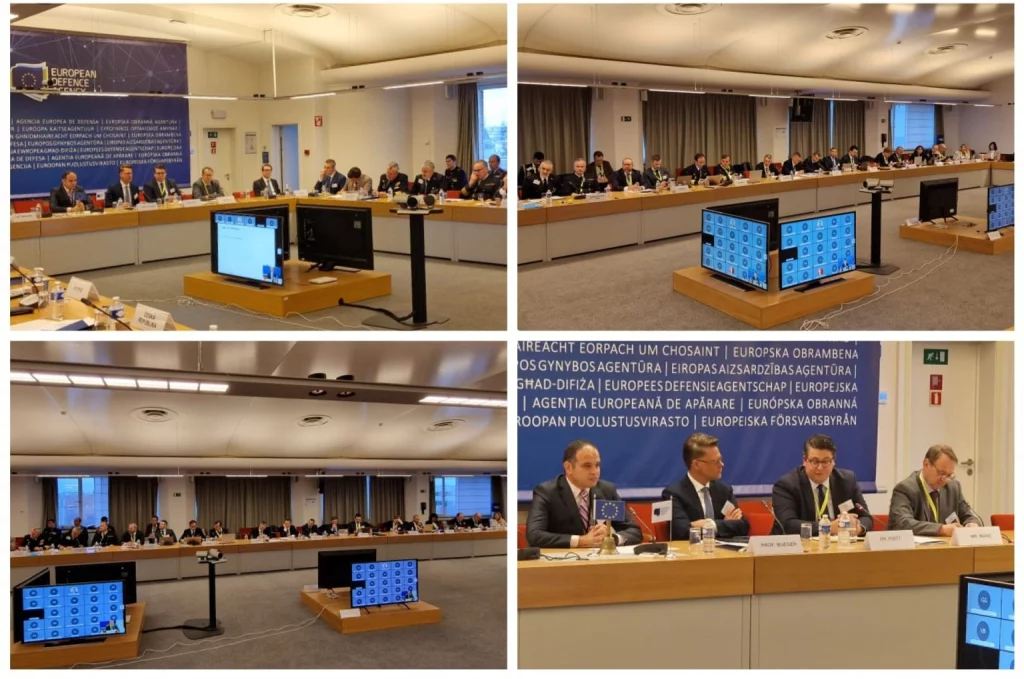
I had the pleasure to participate in a symposium organized by the EDA on November, 18th in Brussels. The event evaluated the state of MDA in Europe and how MARSUR could be improved. At the event, I introduced my research on MDA and discussed what barriers to information sharing must be overcome.
Participation in SHADE Med
On the 15th and 16th of November, I am participating in the Shared Awareness and Deconfliction in the Mediterranean (SHADE Med) meeting. SHADE Med is an informal naval coordination mechanism that was created in response to the challenges that irregular migration posed in the region. It draws on the role model of a mechanism that was created for the purpose of counter-piracy in the Western Indian Ocean.
The focus of the meeting is on “New challenges to regional security in the Mediterranean”. In addition to operational updates on the operations IRINI (EU), SEA GUARDIAN (NATO) and MEDITERRANEO SICURO (Italy), the are a number of strategic themes that will be discussed. The first day focuses on the implications of the EU’s new Strategic Compass, published in early 2022. On the second day the situation in Libya, new challenges to maritime operations, and the interdependence between food, energy and climate change will be discussed.
I will be contributing to the theme on new challenges, introducing our research on critical maritime infrastructure protection and what the implications for maritime operations in the region are.
Searching for a new vision of ocean politics – lecture at University of Malta
The oceans have gained much world political attention. Yet, ocean debates continue to be structured by three visions – the oceans as closed, free or global commons. In a talk I will be giving at the Department of International Relations, University of Malta, I argue why these visions are limited. We have to ponder about alternatives. I outlines how thinking with ‘infrastructures’ can help us to go beyond territory, freedom, state-centrism and formal law, enables paying attention to technology and economics, and capturing global ocean politics in the age of the anthropocene.
The talk titled Ocean Infrastructures – Searching for a new vision for global ocean politics, takes place on November, 23rd (12.00-13.30), Boardroom 212, Old Humanities Building, Department of International Relations, Faculty of Arts.
Lecture in Rome on critical maritime infrastructure protection
On Monday, November 14, 2022, I am giving a talk at John Cabot University, titled Beyond invisibility: Protecting maritime infrastructures after the Nord Stream Sabotage.
In the talk I will be summarizing our recent research on critical maritime infrastructures, and the consequences of the attacks on the Nord Stream 1 and 2 pipelines
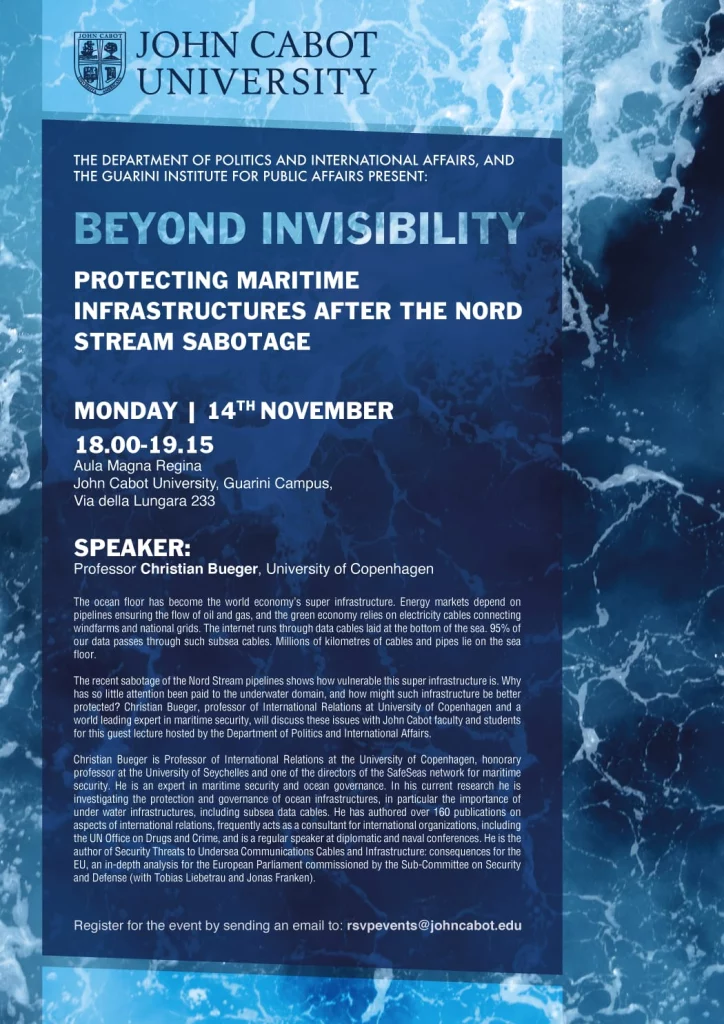
Online lecture on the history of maritime security cooperation
On October 26th I had the pleasure to contribute to the Capacity Building Virtual Lecture series organized by ReCAAP Information Sharing Centre. The centre is one of the key hubs in Southeast Asia for the collection and sharing of information on piracy.
In my lecture titled “Addressing maritime security threats through international cooperation: the opportunities and risks of forum shopping” – available online soon -, I argued that it is important to pay attention to the historical evolution of maritime security cooperation. My key objective was to contextualize the work of ReCAAP and related information sharing and maritime domain awareness centers.
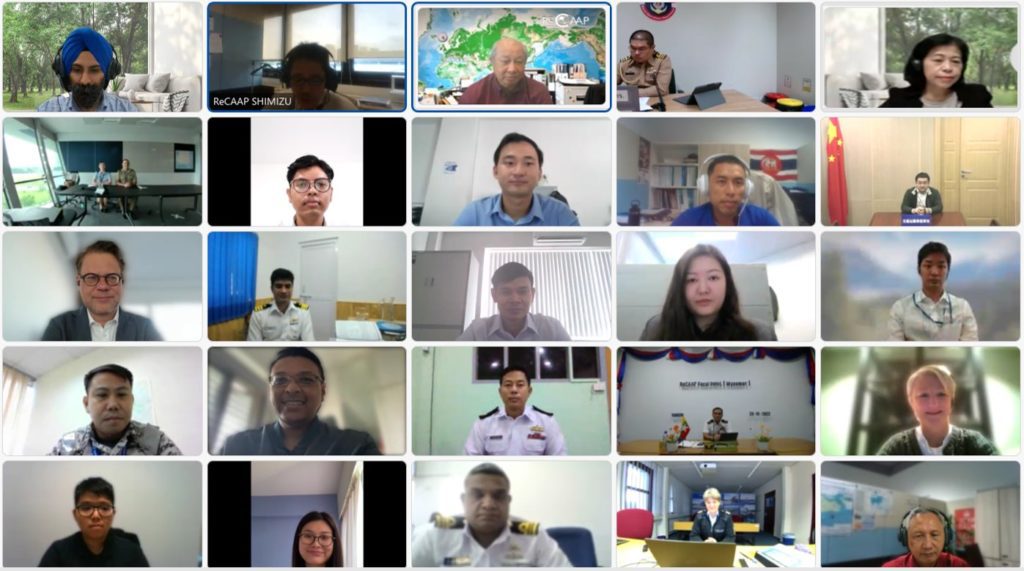
I demonstrated how this history is one of changing security priorities, from inter-state disputes, to environmental concerns, to maritime terrorism, to piracy and to holistic maritime security thinking. Along of this history we see a continuous growth of institutions, forums, centers and other arrangements which aim at dealing with maritime security. Now clear institutional centers have evolved however, and the overall system that has grown can be described as overly complex or even fragmented.
That produces problems in its own right, such as the absence of global standards for maritime security reporting, but also risks of overlap and duplication. I also pointed out that one of the drivers of this is the tendency to create new bodies, rather than making old ones work, as well as the tendency, in particular by more powerful actors, to choose and pick which institutions fit their interests better, rather than working towards more coherence.
What is the right mix of interventions for maritime security in the global South?
This was one of the questions that was discussed at a webinar on the situation in the Gulf of Guinea on 21.10. At the seminar organized by the Portuguese Atlantic Center in collaboration with the Gulf of Guinea Maritime Institute, the first key issue was what the state of the maritime security architecture currently is. Solomon Agada from the Nigerian Navy, and Cilles Ghehab from the GoGIN project addressed the substantial progress under way.
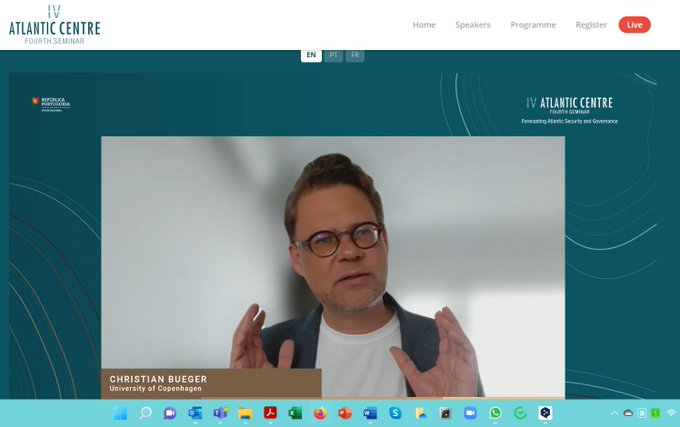
The debate then turned to more general questions about interventions and capacity building. Emanuel Bell Bell from the ICC Yaounde argued that more local ownership is needed and dependency needs to be reduced. In my own contribution I drew on the lessons from our book on capacity building and the research done in the frame of the AMARIS project. I argued for the importance of recognizing the political dimensions of capacity building – local, regional, and geopolitical – and turning to long term funding and maintenance questions. I also highlighted the importance of appreciating failures in capacity building to learn, not the least given much of current projects are experimental in nature.
Event on critical maritime infrastructures
Last week we held an event on how to improve the protection of critical maritime infrastructures. What makes infrastructures ‘critical’ and what are the dilemmas of protecting them?
Tobias Liebetrau, Jan Stockbruegger, Veronika Šlakaitytė, Kimberley Peters and I discussed these questions. Read our full event summary here,
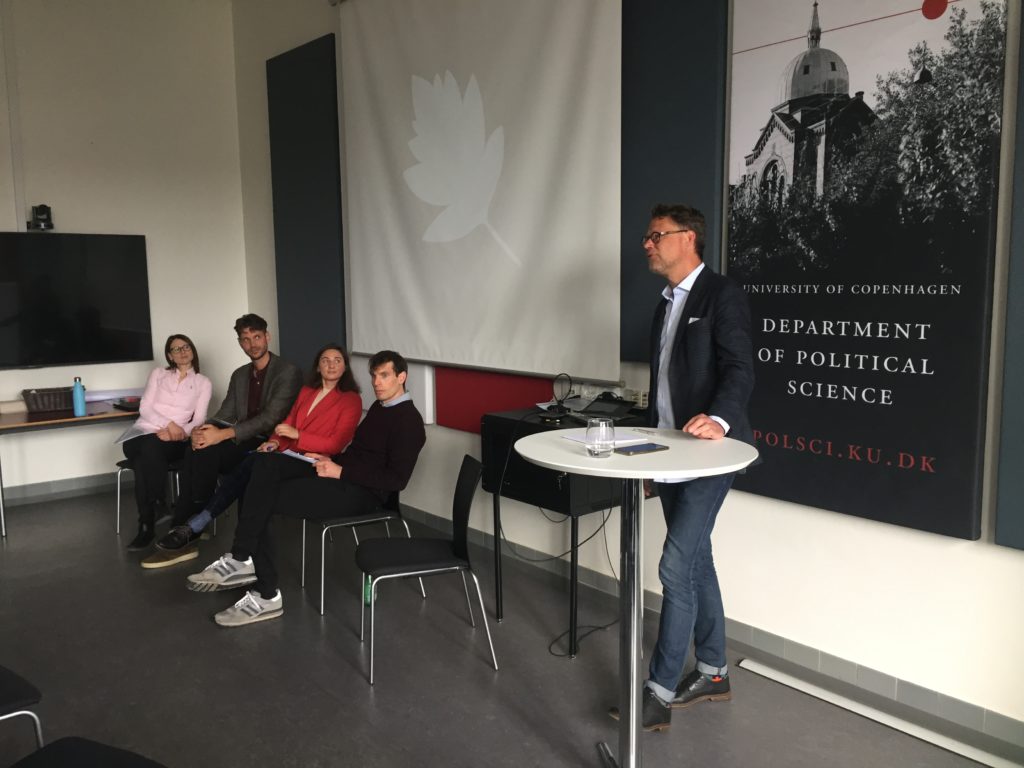
Some take away points:
- Critical maritime infrastructures is more than cables and pipes, it also concerns shipping.
- Designating infrastructures as ‘critical’ is a political choice, and we need to be aware that our focus has been shifting from terrorism, to cyber, and now to grayzone warfare.
- Information sharing is needed and legal ambiguities need to be reduced.
- We need a discussion on who pays the costs of protection.
- Focus should not only be on detection and deterrence, but also on increasing the capacities for repair.
Workshop on Ocean Infrastructures – Launch of our new research group
Our new research group on Ocean Infrastructures was launched with a workshop exploring how marine activities are shaped by various infrastructures on 13th and 14th of October.
How do infrastructures enable and restrict oceanic practices and produce new forms of agency, spatiality and materiality in the oceans? That was the key question we addressed with 20 scholars from different disciplines, including geography, international relations, law and science and technology studies. The goal of the workshop was to explore the variety of ocean infrastructures, but also the question in how far the conceptual vocabulary of infrastructures can shed new light on how the oceans are governed today.
We explored infrastructures reaching from shipping to under water tunnels and choke points, but also in how far international institutions, treaties and global ocean narratives can be conceptualized as infrastructures.
Part of the workshop was also an excursion to the maritime history of Denmark with a visit to the naval facilities at Holmen, and a public roundtable that took the current interest on critical infrastructure protection as its focus.
The workshop not only marked the launch of our research group funded by the Velux Foundation, but also kickstarted our work on an edited volume on ocean infrastructures which we hope to complete by the end of 2023.